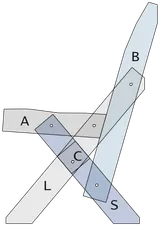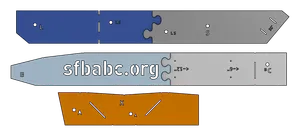Each bench has two leg frames at each end of the bench (and possibly more in the middle) to support the seat and backrest slats.
Each leg frame has two legs: a long forwards leg (L), and a short backwards leg (S),
as well as a seat rest (A), a backrest (B), and a center spacer (C) positioned between L and S.
Template Assembly
The templates have been designed to ship in five pieces, and then be assembled with puzzle-piece joints. Once assembled, they form one long leg template, one long backrest template, and one short seat-rest template.
The joints are a tight fit, and you may need to use a soft-faced hammer or mallet on a flat surface to seat them together.
Legs Template (LS)
Click on an images to view it in full-size.
Each pieces has three (of the four) holes marked.
 |
|---|
The L long leg piece. Uses the full template. Mark the top (left) three holes (furthest from the angled foot). |
If you plan to anchor your bench to the ground, mark the two slits near the foot for the mounting brackets.
Positioning
Trace two short S legs and two long L legs from the template onto your pressure-treated 2x4x8.
The angled foot cut of adjacent legs should touch, as shown, to ensure all pieces fit.
The legs can be traced in any order, as long as the angled feet touch.
Seat & Back Rest Templates (ABCX)
 |
|---|
The A seat rest piece. Mark both holes. The X cross-brace trapezoid is also included on this template. |
sfbabc.org Stencil
The backrest template also has the “sfbabc.org” stencil on it, which can be applied to the bench with spray paint.
Positioning
Trace two A seat rests, two B backrests, and two C center spacers from the template onto your other 2x4x8.
The angled back sides of the A pieces should touch, as shown, to ensure all pieces fit.
On the template, the A pieces use the two innermost holes, while the B pieces use the two outermost holes.
The two A pieces must have their angled back sides touching.
The other pieces can be traced in any order.
Slat Pilot Holes
The backrest stencil also has small pairs of holes which are 6 or 12 in. from the end.
| Bench length | Hole dist (2 legs) | Hole dist (3 legs) |
|---|---|---|
| 4-5 ft. | 6 in. | x |
| 6 ft. | 12 in. | x |
| 7 ft. | x | 6 in. |
| 8-9 ft. | x | 12 in. |
We will need to drill pilot holes for the screws that will hold the slats to the leg frames. The leg frames need to be properly spaced to support the entire length of the bench; we should avoid any spans between slats greater than 4 ft. to prevent sagging.
The template has small pairs of holes which are 6 or 12 in. from the end. The table to the right shows the recommended distance for each bench length. “Hole dist” is the distance from the end of the slat to the outer pilot holes.
Align the square end of the template with the end of the slat and find the correct pair of holes. Keep the drill vertical and use the small (3/32 to 1/8 in.) bit to drill each pilot hole. Each slat needs a pair of holes for each leg frame and brace piece, so 3 leg benches will need 6 holes per slat, with the extra pair in the middle.




